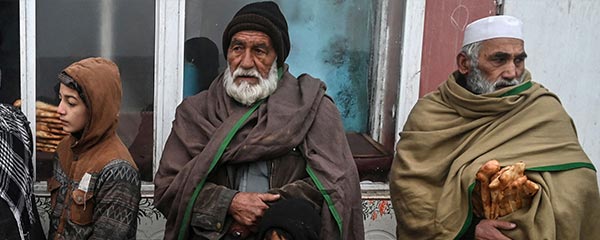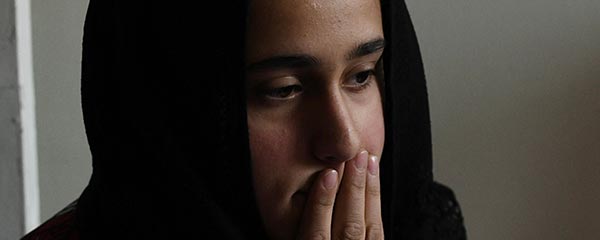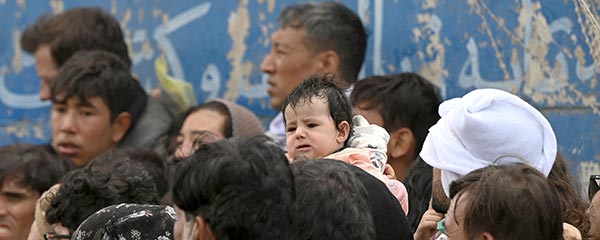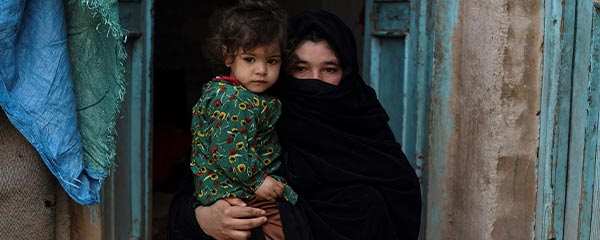Story Highlights
- 94% of Afghans rated their lives poorly enough to be considered suffering
- 96% of Afghan women and 92% of men suffering
WASHINGTON, D.C. -- The Taliban's recent decision to renege on its promise to allow girls to attend school past sixth grade is a stark reminder of how much life has changed for Afghans since the group returned to power last year -- and Gallup's surveys in the country show it hasn't been for the better.
As the Taliban completed its takeover of Afghanistan last year, nearly all Afghans (94%) rated their lives poorly enough to be considered suffering. This was not only a record high for Afghanistan, but also the highest level of suffering that Gallup has measured for any country since 2005.
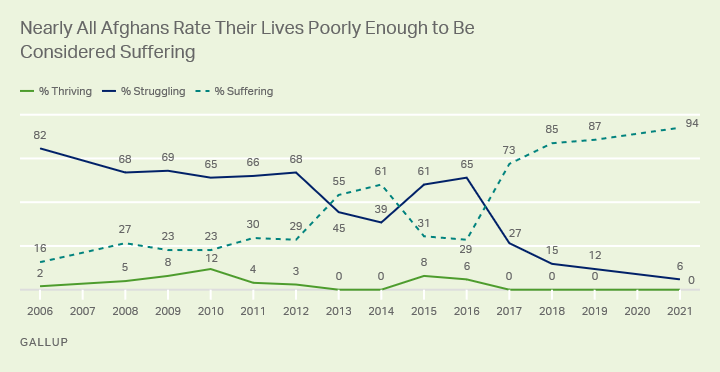
Line graph. The percentages of Afghans who rate their lives highly enough to be considered thriving, struggle or suffering. In 2021, no respondents in Afghanistan rated their lives highly enough to be considered thriving, while six percent were considered struggling. A full 94% rated their lives poorly enough to be considered suffering.
Gallup classifies individuals as "thriving," "struggling" or "suffering" according to how they rate their current and future lives on a ladder scale with steps numbered from zero to 10, based on the Cantril Self-Anchoring Striving Scale. Those who rate their current lives and anticipated lives in five years a 4 or lower are classified as suffering.
Gallup surveyed Afghanistan as the Taliban took control and the U.S. completed its withdrawal, further exacerbating the already bleak economic situation in Afghanistan. However, suffering has been on an upward trend since 2017, as Taliban-fueled violence increased and continued to rise in the face of a prolonged Taliban offensive that seized control of more parts of the country.
Nearly All Afghan Women and Men Are Suffering
Suffering among Afghan women is now nearly universal, with 96% of women in the country rating their lives poorly enough to be considered suffering. For the first time since 2012, the percentage of women suffering is modestly higher than the 92% of Afghan men considered suffering. For much of Gallup's trend, Afghan men have been more likely than women to be suffering.
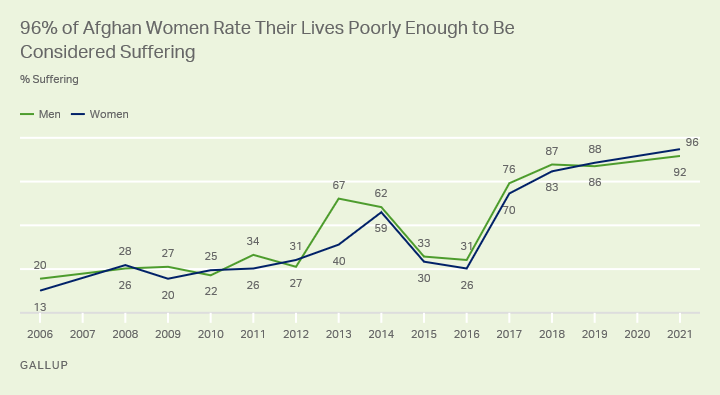
Line graph. The percentages of Afghan men and women who rate their lives poorly enough to be considered suffering. In 2021, 96% of Afghan women and 92% of Afghan men rated their lives poorly enough to be considered suffering.
Afghan women are particularly pessimistic about the trajectory of their lives in the future. This is not surprising given that the Taliban has restricted women from working in any industry other than healthcare or primary education, curtailed women's ability to travel on their own, and banned them from secondary and higher education. When asked how they would rate their lives in five years on a scale of zero to 10, the average score was 1.8 in 2021, the lowest level in Gallup's global trend for women in any country. For men, the average score in 2021 was 2.1.
Suffering Ubiquitous in Afghanistan
There is, generally, little difference in the levels of suffering seen across the regions of Afghanistan. None of the respondents in any region rated their lives highly enough to be considered thriving. And across all regions, 87% or more of Afghans rated their lives poorly enough to be considered suffering.
When examined by income level, all of the poorest Afghans rated their lives poorly enough to be considered suffering. Only among the wealthiest, those in the top 20% for income, were fewer than nine in 10 suffering. None of the respondents at any income level rated their lives highly enough to be considered thriving.
| Struggling | Suffering | |
|---|---|---|
| % | % | |
| Poorest 20% | 0 | 100 |
| Second 20% | 1 | 99 |
| Middle 20% | 3 | 97 |
| Fourth 20% | 6 | 94 |
| Richest 20% | 14 | 86 |
| Data collected in 2021. No respondents at any income level rated their lives highly enough to be considered thriving. | ||
| Gallup | ||
Bottom Line
Afghans are experiencing suffering on an unprecedented scale. In no other country since the trend began in 2005 has a larger percentage of the population rated their lives poorly enough to be considered suffering. And Afghans have little hope that their situation will improve anytime soon. For Afghan women in particular, the future is bleak without access to education for the country's girls.
In recent weeks, global attention has shifted away from Afghanistan, but the crisis in the country has not abated. Humanitarian aid agencies have previously issued desperate calls for funding to provide assistance, including the largest single country aid appeal ever by the United Nations.
And, before the Russian invasion of Ukraine, the U.S. and other countries pledged substantial amounts of aid. However, in the wake of the crisis in Ukraine, it is unclear how much additional aid will be forthcoming.
To stay up to date with the latest Gallup News insights and updates, follow us on Twitter.
For complete methodology and specific survey dates, please review Gallup's Country Data Set details.
Learn more about how the Gallup World Poll works.

